Fair Park’s finances are being audited after its nonprofit manager “notified the city of financial concerns” related to a sub-contract with the operator. The nonprofit Fair Park First is the boss of the Oak View Group, which runs the daily park operations. In a statement, Fair Park First CEO Brian Luallen said the organization learned “a little more than a week ago” that the Oak View Group “may have inaccurately, and we hope inadvertently, allocated and utilized restricted funds raised by Fair Park First for daily park operations.”
“If the inaccurate and unauthorized reallocation of funds occurred, it is a significant matter and shakes our confidence and trust,” the statement reads. “If we discover any restricted funds donated to Fair Park First were utilized incorrectly, we will do everything in our power, in partnership with the City of Dallas, to ensure those funds are returned and redirected as envisioned by the donors.”
Luallen said Fair Park First engaged Malnory, McNeal and Company, PC to conduct the forensic audit in “close coordination” with the city of Dallas. Philanthropic donations are generally intended for capital improvements across its 277 acres—especially building the much-anticipated community park in place of surface parking lots—and not operational expenditures.
“We have formally given notice to Oak View Group of our intention to investigate this matter fully, hopefully in partnership with them, so we may provide robust assurance to our donors investing in Fair Park’s future that restricted funds were allocated appropriately,” Luallen said.
In a letter sent by its in-house counsel, the Oak View Group said it did nothing wrong: “we vehemently deny any wrongdoing on our part with respect to the use of restricted funds. We are confident—and have documentation to support—that all uses of donated funds were with the full knowledge and approval of Mr. Luallen, acting on behalf of Fair Park First.”
The City Council was briefed in closed session yesterday to seek “legal advice of the city attorney regarding the city’s management contract with Fair Park First.” The Dallas Park and Recreation Board is hearing the same thing behind closed doors today.
Nobody on Council or the Park Board would comment. But the city confirmed the audit and issued a statement last night: “Fair Park First, the city’s nonprofit Fair Park manager, recently notified the city of financial concerns related to its sub-management contract with Oak View Group, the entity that manages the day-to-day operations of Fair Park. The city takes these concerns seriously and is taking all necessary and appropriate actions to protect the city’s interest. The city is committed to financial transparency in all its operations, including Fair Park, and will work to maintain the continued vibrancy and success of Fair Park.”
To understand what’s going on, we need to go back to 2018 when the Dallas City Council unanimously voted to privatize Fair Park. Under the conditions of the contract, the city retained ownership of the park’s acreage and buildings but allowed a for-profit operator—then called Spectra, which was acquired by Oak View Group in 2021—to fill its buildings and open spaces with events and other programming. It also ran day to day operations.
Fair Park First was at the top of this org chart, a brand-new nonprofit governing board that was put in charge of managing the operator, raising money, building that community park, and making agreed-upon capital improvements to the aging Art Deco structures. In return, the city agreed to pay $35 million to help cover operating costs over the first 10 years of the contract. This was presented as an annual savings of $8 million compared to what the city itself was spending running Fair Park.
There were two other bidders to run the park. They both asked the city to foot the bill entirely in the form of an annual management fee; one pitch was $14.8 million, the other was $16.9 million. You can see why the Council made the choice it did. Going with the Fair Park First bid meant saving $100 million over the next decade.
Spectra’s pitch at the time was that it didn’t need so much money because it was confident it could use its existing relationships with music promotors and sports agencies and the like to fill the grounds 365 days a year, generating enough revenue to keep its house in order. Any “excess revenue” was supposed to be spent expanding operations at the park or on much-needed capital improvements for the buildings. But the money generated in the park is supposed to remain in the park.
How that money flowed, however, was one of the concerns brought up by members of the Park Board and the City Council at the time. Bobby Abtahi, then the Park Board president, questioned where the money for the community park would come from. (Luallen and his team later led a fundraising campaign to meet the city’s requirement that it brings in $85 million to pay for the new park and other amenities. It is contractually obligated to generate $3 million a year, and it has raised over $44 million to date.) In an interview with Dallas Observer columnist Jim Schutze ahead of the privatization vote, Abtahi also questioned how the revenue would pass between the management company and the nonprofit operator—that’s the “excess revenue.”
It’s not clear how long the audit will take, nor would anyone comment on how much money is being questioned. But Fair Park has had some notable wins since the privatization. The Cotton Bowl is undergoing $140 million in improvements, money that came after voters approved a proposition that allocated some hotel tax revenue to the park and a new convention center. It’s hosted the Rolling Stones and Lionel Messi and his Inter Miami CF. Groundbreaking for the community park is expected in November 2025, after the city finishes an environmental study on the site.
The money it brings in is a mix of revenue from events and other bookings as well as philanthropic gifts. The contracts that created the private operation of Fair Park are complex and dictate specific uses for specific buckets of money. We don’t know what Fair Park First found, but it was significant enough to pull back and order a forensic accounting of where the dollars went.
Update, 4/5: Below is a letter that in-house legal counsel for Oak View Group sent to Fair Park First.
Correction: A previous version of this story said Fair Park First must raise $85 million by the end of the year; that is actually the amount of its total capital campaign, and doesn’t have a deadline.
Author






